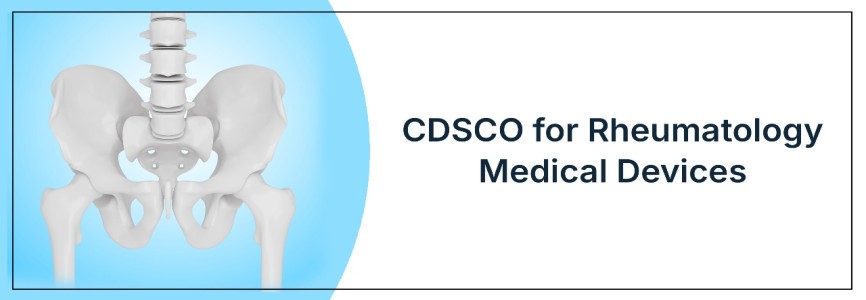The Central Drugs Standard Control Organization (CDSCO) plays an important role in regulating the sale, manufacture, import, and distribution of medical devices in India. Among its responsibilities, CDSCO also manages the classification and registration of Rheumatology Medical Devices. With a growing demand for quality and safety in medical tools and equipment, the CDSCO Registration for Rheumatology Medical Devices has become increasingly important.
Role of CDSCO
CDSCO is the National Regulatory Authority under the Ministry of Health and Family Welfare, Government of India. It is headed by the Drug Controller General of India (DCGI). CDSCO oversees and regulates the quality and safety of drugs and medical devices in India. Before 2006, medical devices were not thoroughly regulated, exposing consumers to risks associated with substandard and unapproved devices. Over the years, CDSCO has become more active in ensuring that all medical devices sold in the Indian market meet specific standards.
The major functions of CDSCO include:
-
Medical Device Registration: Ensuring that all devices being marketed in India are properly registered.
-
Formulating Standards: Setting benchmarks for medical devices, drugs, and in-vitro diagnostics (IVDs).
-
Regulatory Framework: Establishing and updating rules, laws, and amendments.
-
Market Authorization: Granting approval for selling specific medical devices and drugs.
-
Monitoring Clinical Research: Supervising clinical trials and research activities.
-
Manufacturing Licenses: Issuing licenses for the manufacture of drugs and related products.
-
Import Quality Checks: Regulating and testing imported drugs.
-
Central Drug Testing: Verifying drug quality through designated laboratories.
Risk-Based Classification of Medical Devices
As per the Medical Device Rules, 2017, CDSCO follows a risk-based classification for medical devices and IVDs. The classification helps determine the regulatory control based on the potential risk associated with the device.
|
Classification |
Risk Level |
|
Class A |
Low-risk |
|
Class B |
Low to moderate risk |
|
Class C |
Moderate to high risk |
|
Class D |
High-risk |
This system ensures that higher-risk devices undergo more stringent regulatory scrutiny before approval.
Non-Notified Medical Devices and Their Inclusion
Initially, CDSCO regulated only a limited number of medical devices in India. However, with the medical device sector expanding rapidly, the need for regulating non-notified medical devices became apparent. To address this, the Ministry of Health and Family Welfare issued a notice on 11th February 2020, inviting voluntary registration of non-notified devices.
Subsequently, on 3rd September 2020, CDSCO published another notice listing 24 categories of non-notified devices, which now fall under the regulatory framework. These devices include tools related to Anaesthesiology, Pain Management, Cardiovascular health, Dentistry, Neurology, and notably, Rheumatology.
CDSCO for Rheumatology Medical Devices
Rheumatology medical devices assist in the treatment and support of musculoskeletal and autoimmune diseases such as arthritis. According to the CDSCO notice dated 3rd September 2020, Rheumatology Medical Devices are now classified under non-notified medical devices and require registration.
This classification means manufacturers and importers must comply with regulatory standards before marketing their products in India. This step ensures that patients have access to high-quality and safe medical tools.
List of Rheumatology Medical Devices Classified by CDSCO
The CDSCO Registration for Rheumatology Medical Devices covers 11 specific items used in rheumatology treatment and care. These devices are as follows:
-
Back Brace – Used to support the spine and reduce back pain for individuals with spinal issues.
-
Canes – Assistive walking tools that provide support for people with limited mobility due to joint disorders.
-
Lateral Wedge Insoles – Help relieve pressure on the knees and are especially useful for patients with osteoarthritis.
-
Grab Bars in Showers and Tubs – Installed in bathrooms to prevent falls for patients with weak joints or muscle pain.
-
Shoe Insert – Custom orthotic inserts used to improve posture and relieve pain caused by improper gait.
-
Reachers – Assist individuals who have difficulty bending or stretching due to joint stiffness.
-
Orthopaedic Pillow – Designed to maintain correct neck and spine alignment for arthritis patients.
-
Orthopaedic Shoes – Provide added support and cushioning for people with joint issues in their feet.
-
Stairway Chair Lift – Mechanized chairs installed on staircases to help patients move between floors safely.
-
Toilet Frames – Provide stability to users while using the toilet, especially beneficial for the elderly.
-
Bottle and Jar Openers – Assist in gripping and opening containers, helpful for patients with limited hand strength.
Each of these devices plays a vital role in ensuring comfort, mobility, and safety for patients with rheumatologic conditions.
Documents Required for CDSCO Registration for Rheumatology Medical Devices
To apply for CDSCO registration, manufacturers or their Indian Authorized Agents must prepare a complete set of documents. The following documents are generally required:
-
Application Form – A formal request form as prescribed by CDSCO guidelines.
-
Challan TR6 – A receipt of fee payment to the government.
-
ISO 13485 Certificate – Proof that the manufacturing process meets international quality standards.
-
Power of Attorney – Grants authority to the Indian agent to act on behalf of the manufacturer.
-
Undertaking – A declaration confirming the accuracy of all information submitted.
-
Certificate of Quality Assurance – Validates that the product meets safety and quality benchmarks.
-
CE Design Accreditation – Indicates compliance with European safety standards.
-
Declaration of Conformity – A statement from the manufacturer declaring the product’s compliance.
-
Schedule D(I) – Regulatory information as per Indian requirements.
-
Master Plant File – Provides details about the manufacturing facility.
-
Device Master File – Technical and product-specific information.
-
Free Sale Certificate – Confirms that the product is freely sold in the country of origin.
Proper preparation and submission of these documents are essential for successful registration.
Procedure for CDSCO Registration for Rheumatology Medical Devices
The registration process involves multiple steps and must be handled with care to avoid rejection. Below is a detailed explanation of each step:
-
Identify the Device Classification The first step is to determine whether the rheumatology medical device falls under the non-notified or notified category. Applicants should refer to the updated list on the CDSCO portal and confirm that their device requires registration.
-
Appoint an Indian Authorized Agent (IAA) If the manufacturer is based outside India, they must appoint an Indian Authorized Agent. This agent will be responsible for communication with CDSCO, submitting documents, and ensuring compliance with Indian laws. The agent acts as the official representative for all regulatory purposes.
-
Document Compilation and Submission All necessary documents mentioned earlier must be compiled and reviewed carefully. Any error or missing document may lead to delays or rejection. The documents are then submitted either online via the Sugam portal or physically, depending on the regulatory requirement.
-
Review and Verification Once submitted, the CDSCO authorities review the documents for accuracy and completeness. They may raise queries or seek clarifications. Applicants must respond promptly and clearly to any communication from CDSCO.
-
Issuance of Registration Certificate After all documents are found to be satisfactory and the application process is complete, CDSCO issues a Registration Certificate. This certificate allows the manufacturer or importer to market the medical device legally in India.
Conclusion
The CDSCO Registration for Rheumatology Medical Devices is a vital step to ensure the availability of safe and quality medical equipment for patients suffering from joint and autoimmune disorders. The classification of rheumatology devices under the non-notified category means that they must now comply with Indian regulatory standards before being sold in the market. This process, although systematic, involves careful documentation and legal compliance. Errors during the registration process can lead to unnecessary delays and financial losses. Therefore, it is always advisable for manufacturers and importers to consult experienced professionals who are well-versed with the CDSCO procedures.
If you need any further assistance in CDSCO Registration for medical devices, cosmetics, and drug-related products then you can book a free consultation with our experts through email info@ccoffice.in or Call/Whatsapp at +91 9988424211.
FAQs
Q1. Is CDSCO registration mandatory for Rheumatology Medical Devices?
Ans. Yes, as per the CDSCO notice dated 3rd September 2020, Rheumatology Medical Devices are classified under non-notified medical devices, and registration is mandatory for their legal sale in India.
Q2. What is the timeline to obtain CDSCO registration for Rheumatology Medical Devices?
Ans. The timeline may vary depending on the accuracy of submitted documents and any queries raised by the authority, but generally, it can take 6 to 12 weeks.
Q3. Who can apply for CDSCO registration on behalf of a foreign manufacturer?
Ans. A foreign manufacturer must appoint an Indian Authorized Agent (IAA) who will represent them before CDSCO and handle all regulatory procedures.
Q4. Are CE-certified Rheumatology devices automatically approved in India?
Ans. No. While CE certification supports quality claims, it is not a substitute for CDSCO registration. Registration in India is still required.
Q5. Do all types of Rheumatology devices fall under CDSCO registration?
Ans. Yes, all 11 listed devices including braces, insoles, orthopedic shoes, etc., are subject to registration as per the CDSCO’s classification.
Q6. Can I apply for CDSCO registration online?
Ans. Yes, the registration process can be initiated through the Sugam portal, which is the official CDSCO online platform for regulatory submissions.
Q7. What happens if a device is sold without CDSCO registration?
Ans. Selling unregistered devices is a violation of the Medical Device Rules, 2017, and may lead to penalties, product seizure, or legal action by authorities.























_crop10_thumb.jpg)
_crop10_thumb.jpg)



_crop10_thumb.jpg)








_crop10_thumb.jpg)























2018_learn_crop10_thumb.jpg)



